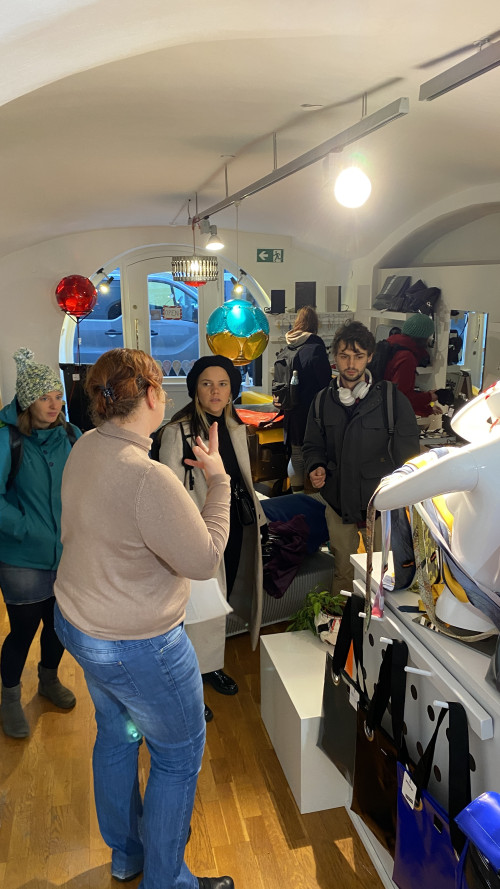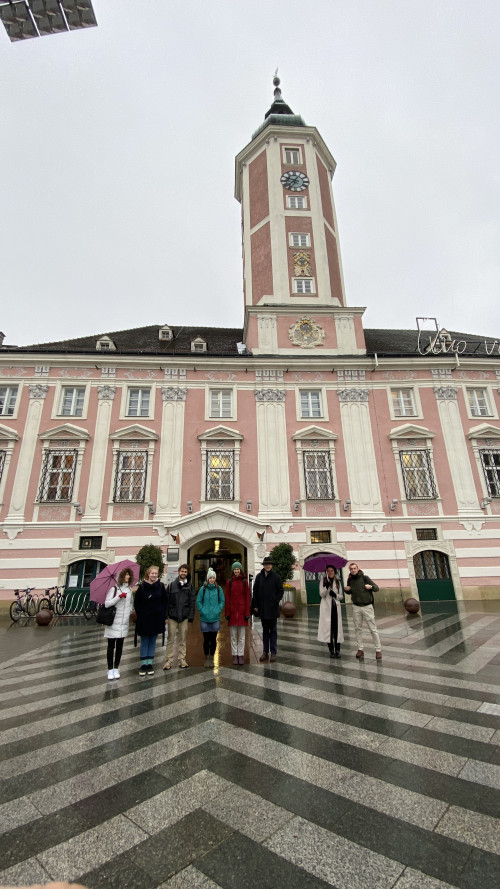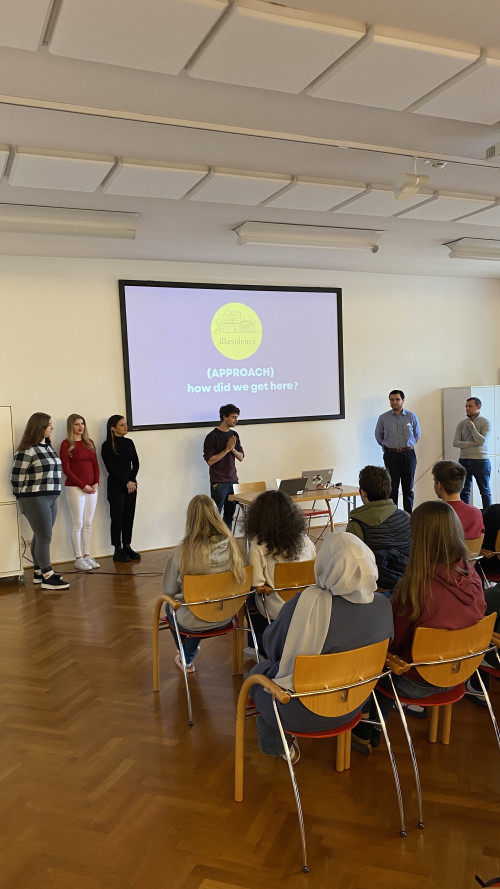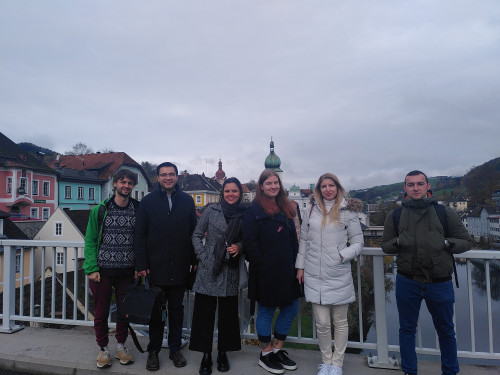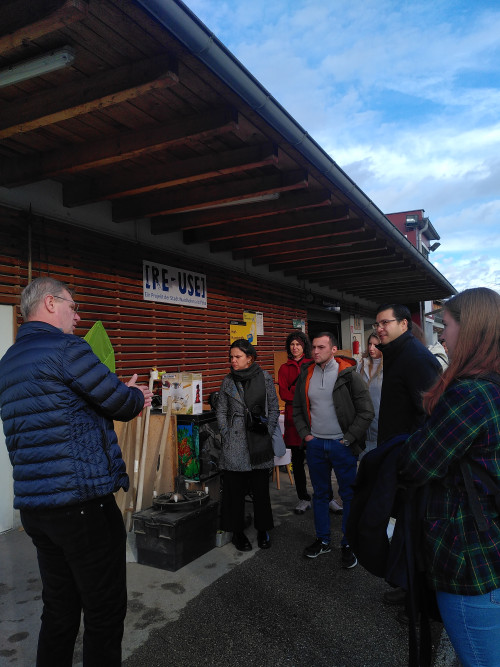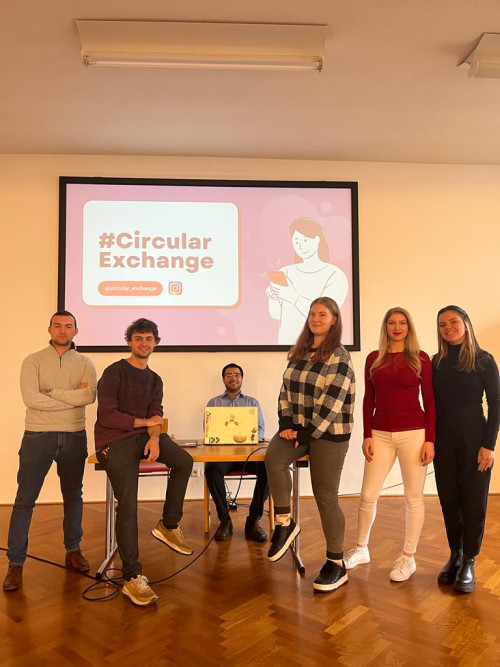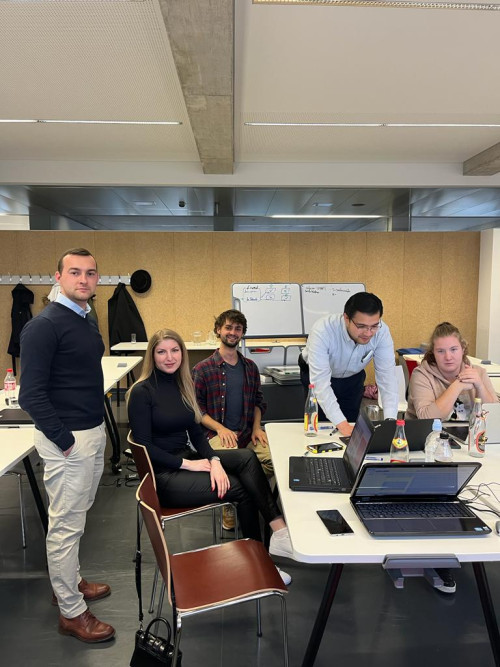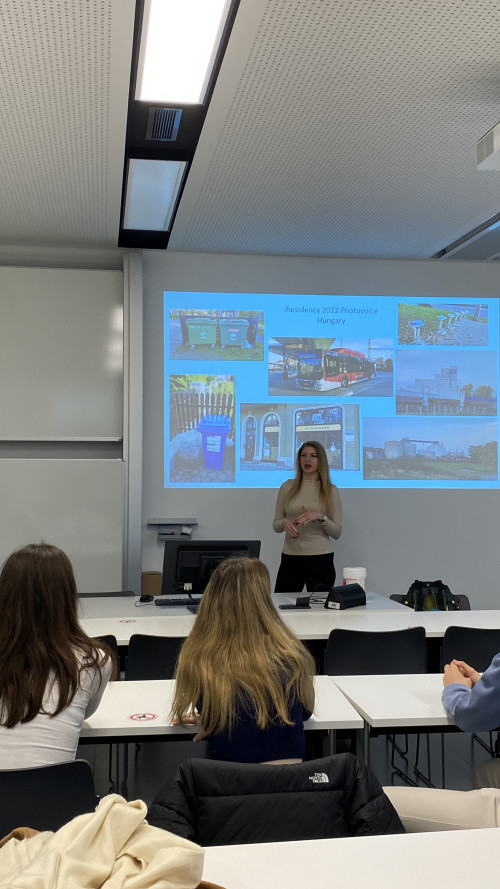
Successful first edition of the E³UDRES² iResidency
The first iResidency in Lower Austria was a big success
The very first E³UDRES² iResidency took place between the 16th and 22nd of November at St. Pölten UAS and the region of Lower Austria. With an aim to be familiar and understand rural European communities, six E³UDRES² students came together in Austria and engaged with local schools, citizens, companies, and institutions, and recognized good practices and challenges on the topic of Circular Economy. Our first six iResidents were asked to delevop a new product to raise awareness on waste management in the area of Lower Austria.
Meet our first iResidents
Anete Bite, Latvia
Hi, my name is Anete Bite, like the small animal bee, I’m from Latvia, Vidzeme University of Applied Sciences, studying Communication and PR in last course. I really like different TV shows, music, shopping, meeting new people and cycling, also recently I have found my lost love for reading books, which is amazing.

David Prenninger, Austria
Hey, I'm David from St. Pölten!
I study in the field of railway technologies and management of railway systems.
In my free time I build Software, travel around Europe and enjoy controverse discussions.

Pevin J. Bittler-Wagner, Germany
Hello everyone, I am Pevin J. Bittler-Wagner, a master student at the University of Applied Sciences in Fulda, Germany studying on the subject of international and strategic management. In my free time I am into listening and playing musical instruments such as the trumpet. I am also most passionate about cooking (as you may have noticed) and love to travel around the globe to meet new people, learn new languages and to explore unknown cultures.

Jéssica Camargo, Portugal
I'm Jéssica Camargo, I'm 33 years old and I'm a student of a Master’s in Marketing Management at the Polytechnic Institute of Setúbal, Portugal. Fields of study and research such as Brand Activism, Consumer Behavior and Digital Society are my favorites. Among my hobbies, I enjoy outdoor activities, visiting historical places and some trekking adventures.

Bernadett Nagy, Hungary
My name is Bernadett Nagy, I am 28 years old, I was born and raised in Hungary, and I am a PhD student in Management and Organizational Sciences at the MATE Hungarian University of Agriculture and Life Sciences at the Kaposvár Campus, which is one of the university’s campuses, as it has five campuses in the country. My research field is Circular Economy. I am interested in many forms of arts, but my favourite activities are to go to museums, traveling and watching movies.

Denis-Florin Mădroane, Romania
Hello! I’m Mădroane Denis-Florin and I’m from Romania. I am a master’s degree student at Politehnica University of Timișoara, studying advanced mechanical engineering. Some of my hobbies are playing and watching football, but also I have an interest for motorsport.

Days full of work and interesting insights
For the iResidents, the work started from home, where they had to find good examples and challenges on circular economy from their regions. At St. Pölten UAS, they had the opportunity to have a fruitful cultural exchange on the differences of rural European areas and, at the same time, get the chance to explore the city of St. Pölten. In addition, the students joined two planned excursions in the surrounding areas of Lower Austria. Specifically, the first excursion took place in Waidhofen where the iResidents visited the beta campus, a community coworking and innovation space. There they had the chance to hear about the campus' history, project, and vision, but also to present their own results from their regions. Furthermore, they visited the Waidhofen City Hall, where they met the environmental council of the municipality and discussed the aims and vision of the region towards becoming more climate neutral. The first excursion ended with a visit to the Waidhofen waste management centre. The second excursion took place in Melk where the iResidents spent the day at the premises of Melk secondary school (Stiftsgymnasium Melk) and had the chance to discuss with the students and learn about the school’s good practices on sustainability and waste reduction.
Experiences from the iResidents
We asked our six iResidents to give us their perspective on the iResidency and share some of their experiences:
How would you describe the iResidency?
Jéssica: The opportunity to be in touch with different experiences and visions about the present and to learn about the different challenges of the regions was important to articulate how these diverse contexts and best practices can contribute to a more sustainable and circular future for the regions. From my perspective as a Marketing Management student, research networks, new business models, design thinking for products, and new consumer behaviours were key foundations for the dynamics of this future.
David: From my perspective, an iResidency resembles a short but impactful gathering of people from different European nations working on and learning about solutions and great ideas. It is set up to allow interaction and familiarize with a region to better understand local habits, environment and needs. In our iResidency, even for me as a local, new perspectives on issues were created during excursions around the region.
Pevin: A great academic exchange filled with international mindset, mindful collaboration and informative insights on the topic of circular economics.
Denis: It was an interesting experience where I could explore a different region and meet new people. During these days, I could see different approaches concerning the circular economy and how it influences our daily life.
What motivated you to join the iResidency?
Bernadett: My research field is in circular economy, and I was really interested in other regions’ knowledge, solutions and/or problems in the topic.
Anete: I jumped in this project on very late notice but somehow managed to make it work. I accepted the invite because I thought to myself “hmm, this might be interesting, a new challenge for yourself”, and those who know me already know that through the last six months I have challenged myself in different fields, participated in many E³UDRES² activities and just widened my view of the world.
Jéssica: Knowing different contexts and challenges about the Circular Economy, mainly from the pupils' perspective was one of the motivations. Above all, talking about good practices can facilitate the replication of these concepts, resources and technologies in regions that still face some obstacles or present great opportunities to be more circular and smarter yet unexplored.
What was a surprising fact about rural Austria that you have never encountered in your country?
Pevin: Lower Austria is filled with interesting facts on the topic of circular economics of which I would like to highlight one that we had the chance to encounter. I was baffled by the thorough and consistent understanding from the Austrian high school students on the topic of circular economics. During our discussion sessions with the students, a wide range of challenges / difficulties were addressed as well as possible solutions to encounter them.
Denis: I was surprised to see that there is a Recycling Centre in the rural part of the region.
David: Even knowing the region a bit, I was surprised to see how extensive local efforts in creating sustainable regions in Lower Austria are. This includes the detail and complexity of the waste management in Waidhofen, followed up by local innovation projects like the beta lab initiative to bring innovation back to the region and local companies.
How was your experience with collaborating with students from different countries?
Bernadett: I felt really lucky with the team, they were motivated, kind, and easy to work with them. We formed friendships, and for sure we are going to meet in the future. It also makes the future work/meetings with each other more fun.
Anete: On the first day I was thinking “oh, what new can I bring to these masters and PhD students”, but then over the next few days I opened up, showed myself and brought something to the team. I tried to not to be too hard on myself, because in the end, we all gathered in St. Pölten to solve a problem and I think that we definitely did. I have once again made new friends because of E³UDRES² and this family for me just keeps on expanding which is amazing!
Denis: It was a great opportunity for me to collaborate with students from different countries because I was able to see different approaches to the problems, different ideas coming together in the same plan.
What was the highlight of your participation in the iResidency?
Anete: To be able to work with students from different degrees, see their view and be heard. I was also happy to meet other students and work group members from other E³UDRES² activities. I’m really happy I was able to do my part in this project and I’m glad that I was accepted.
David: I think it is really inspiring to see how much can arise if you have the chance to directly speak with the stakeholders of your project. In our case, that applies to the pupils of two high schools we visited. All the ideas, discussions, and critic these kids provided have been really helpful to guide our thinking process towards an end goal. And of course, besides the "hard" work, we also had the chance to spend some time together exploring St. Pölten and having lots of fun.
Pevin: Highlights were overall the exchange of ideas and experiences within the international student group on the topic of circular economics, the “Sustainable activities” already in place within the region of Lower Austria such as the visit to the state of the art recycling plant in Waidhofen and the Austrian hospitality during our stay in St. Pölten.
Jéssica: Undoubtedly, knowing challenges and opportunities and making this experience the starting point to contribute with ideas for group work was a highlight. From so many different points of view - whether from participating students or pupils - #CircularExchange aims to be a source of education and engagement, to motivate active participation in this paradigm of transformation, and to offer students a platform for voice and outreach.
Bernadett: It is really hard to decide, but the beautiful places we visited, but the ideas I got and the connections we formed were also highlights.
Denis: The highlight of my participation in the iResidency was interacting with students from different countries and putting all our ideas together, working as a team.
The outcome: Circular Exchange
During the iResidency the students worked together to create a product or campaign in order to raise awareness on sustainability and waste reduction.
After taking into consideration their regional good practices and challenges, as well as the exchange they had with regional students, citizens, and stakeholders, our iResidents decided to kick off a social media campaign entitled Circular Exchange. Circular Exchange is a social media campaign currently running on Instagram, which aims to raise awareness on circular economy through photovoice challenges. The iResidents had the chance to present their campaign to students from Waidhofen and Melk, get feedback and further recommendation, which will help them fine-tune and strengthen their campaign. Give Circular Exchange a visit and feel free to participate in their ongoing challenge!


